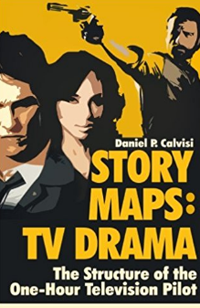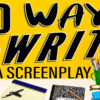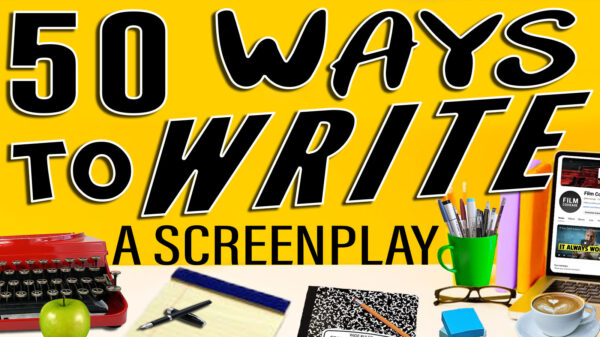[Watch the video interview on Youtube here]
Film Courage: Dan, how was it to get your first job as a script reader and (if you can) paint a little bit [of a picture] of your life at that time?
Daniel Calvisi: Well, I’d gotten out of NYU film school and I definitely was interested in screenwriting. That was kind of my focus coming out of film school. I really wanted to get into script reading and I had been interning at the Tribeca Film Center in New York for a company that was co-owned by Robert De Niro’s production company and in the same building was Miramax Films. And so I just kind of got to know some people there and it’s funny, my first reading job for them was for their genre division called Dimension films. I remember getting a referral but the guy said that they were not hiring now “Don’t bother calling them.” And because I had a lot of initiative, I called anyway. The first thing the supervisor said to me when he picked up the phone was “Oh…we have a reader job open. Do you want to test for it?” So I did a test coverage which is they give you a script that they’ve already had coverage on. I did coverage on it and they evaluate you on that coverage because they already know the script really well. And so that’s how I got working for them. Then I transferred over to the Miramax division which was their parent company and I had also been freelancing for a number of other companies in New York City (other production companies and studios).

One of Dan Calvisi’s books STORY MAPS: How To Write A GREAT Screenplay – see it on Amazon here
Film Courage: When you came to New York to attend NYU do you remember some of the scripts in your mind that you thought “This is the genre I want to write in. This is what I want to create”?
Daniel Calvisi: It’s funny because growing up I was more into Spielberg’s work or more action stuff like RAMBO and that kind of stuff. Then before I went to NYU (I transferred in as a junior), I started getting into Scorsese and I was watching TAXI DRIVER, GOODFELLAS and those kind of movies…and Oliver Stone. And I knew that Scorsese and Oliver Stone and Spike Lee had gone to NYU so I really wanted to go there. I applied and I got in just on the waitlist and then they called really late in the summer before my junior year and said “We have an opening on the waitlist.” So that’s why I went to NYU. That’s how I was able to get in. And it was just really cool to be in New York where these filmmakers that I really admired had gone. So Scorsese, Oliver Stone, Spike Lee, The Coen Brothers, these were all filmmakers that I wanted to emulate.
“So I had to learn on the job, trial-by-fire and just learned to read really fast and to intuit that movie structure. As I am reading this book, I’m asking myself “Will this transfer over to a movie? Does it have that potential for that 3-4 act structure that 95% of great movies use?”
Film Courage: So going back to what your jobs or tasks were, you finally get in. You were told “Sorry…don’t even bother.” You give it a shot anyway, it turns out (as luck would have it), the do have a slot. Do you remember what your first few weeks were as this script reader?
Daniel Calvisi: I remember that I got scripts and books because I was in New York and that was the literary capital, so I would read a lot of books ahead of publication. The agents and book editors would send a book out to the studios to see if any studios or production companies wanted to option the movie rights. And so I would be the first reader at the production company or studio to read that unpublished galley version and that was hard to do because a lot of times they would literally give you a 600-page book to read overnight and you had to write up a 3-5 page report about it by Noon the next day. That was hard to do. I actually got let go from one of my jobs early on because I just couldn’t turn over the material that fast. So I had to learn on the job, trial-by-fire and just learned to read really fast and to intuit that movie structure. As I am reading this book, I’m asking myself “Will this transfer over to a movie? Does it have that potential for that 3-4 act structure that 95% of great movies use?”
Film Courage: And so it was all about structure? There wasn’t also dialogue?
Daniel Calvisi: No…well it was evaluating the whole thing. As a script reader I was evaluating the whole script, structure, dialogue, character development, all that stuff. But if you’re reading something like a novel or a graphic novel or a piece from The New Yorker or Rolling Stone [Magazine] or any kind of article that they’re interested in making a movie of, you have to evaluate it as a potential movie, so you’re asking yourself “Does it have the 3 or 4 act structure of a commercial film?”
Film Courage: That interesting because it sounds actually fairly intimidating because I know I’ve been in situations like this where no one really tells you what the rules are. You kind of (as you said) intuit or watch other people [their actions]. So how was that? Were people actually giving you tips on how to deal with all that? Or no, was it was every man for himself?
Daniel Calvisi: Not a whole lot. You didn’t get a whole lot of feedback. When I was first starting out, maybe a few supervisors might have given me a few little tips about coverage. But after awhile they don’t really give you any feedback. You don’t even know where this script goes after you send in your coverage report. So I would really have to ask afterward like “Hey, that script that I really loved…did anything happen with it?” And so they would tell me “Oh, we didn’t buy it but Fox bought it” or something like that. As a reader, you’re not told anything [laughs], so you have to inquire. You have to have the initiative to see what happens after that. And you’re not part of the process of development or purchasing or bidding on it or anything like that. After you read it once, maybe twice, it’s out of your hands and then your supervisors, the coordinators, the execs, the VPs, they’re the ones who are going to be deciding whether the company is going to option it or not.
Film Courage: And that’s fascinating…I wonder were there certain scripts that you would read just the first 10 pages of and you just knew right away that this was not going to go anywhere?
Daniel Calvisi: Yeah…
Film Courage: So why?
Daniel Calvisi: I mean as crazy as it sounds, it could be the first paragraph. It could be the first line. I mean if there are two typos in the first line…like…it’s probably not going to go anywhere, you know? It’s very rare (incredibly rare) that the first 10, 20, 30 pages will be weak and then the script gets a whole lot better later, you know? If a writer doesn’t know how to write a great Act 1, they’re not going to learn later and suddenly turn it around and have a great Act 2(a) or Act 2(b)…(Watch the video interview on Youtube here).

STORY MAPS: TV Drama: The Structure of the One-Hour Television
BUY THE BOOK – STORY MAPS: How To Write A GREAT Screenplay
https://amzn.to/2zikuK0
BUY THE BOOK – STORY MAPS: TV Drama: The Structure of the One-Hour Television Pilot (Volume 4)
https://amzn.to/2BD2b8w
CONNECT WITH DANIEL CALVISI
Actfourscreenplays.com
Facebook.com/StoryMaps
Twitter
Like this video? Please subscribe to our Youtube channel. Or love this video and want more? You can show additional support via our Youtube sponsor tab or through Patreon.
Advertisement – contains affiliate links:



























